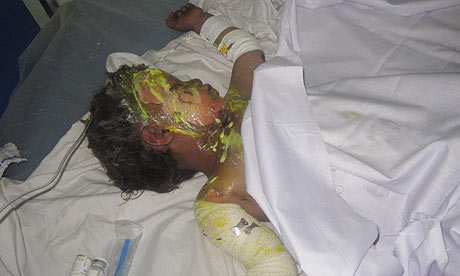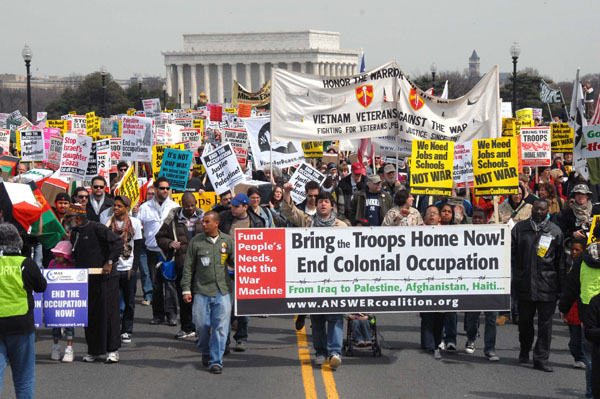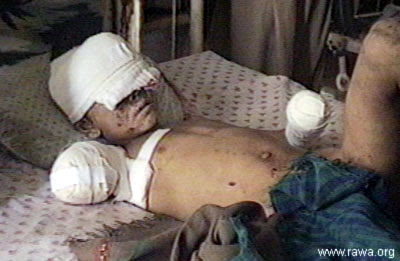Gaza Freedom March News
JAILAN ZAYAN
December 30, 2009
CAIRO: An 85-year-old Holocaust survivor is among a group of grandmothers on a hunger strike to protest against Egypt's refusal to allow a Gaza solidarity march to proceed.
Hedy Epstein, an American activist, and other grandmothers participating in the Gaza Freedom March began their hunger strike on Monday.
''I've never done this before. I don't know how my body will react, but I'll do whatever it takes,'' Ms Epstein said, surrounded by hundreds of protesters outside the United Nations building in Cairo.
Egyptian authorities had said they would not allow any of the 1300 protesters from 42 countries to take part in the march to enter the Gaza Strip through the Rafah border crossing.
High-ranking officers and riot police were placed on the Nile bank, where the UN building is and where hundreds of Freedom March participants asked the UN to mediate with Cairo to let their convoy into Gaza.
They met the UN resident co-ordinator in Cairo, James Rawley, ''and we are waiting for a response'', a Philippines senator, Walden Bello, told protesters. ''We will wait as long as it takes.''
Egypt has increased security along the 380-kilometre road to the Rafah border crossing, a security official said. ''Measures have been tightened along the road from Cairo to Rafah to prevent activists from the Gaza Freedom March from staging the march,'' the official said.
Separately, organisers of another aid convoy trying to reach the blockaded enclave - known as Viva Palestina and led by the British MP George Galloway - said it would head to Syria on its way to Egypt after being stranded in Jordan's Red Sea port of Aqaba for five days.
Turkey dispatched an official on Saturday to try to convince the Egyptians to allow Viva Palestina to go through the Red Sea port of Nuweiba - the most direct route - but Egypt insisted the convoy may enter only through El-Arish, on its Mediterranean coast.
The Gaza Freedom March and Viva Palestina were planning to arrive one year after Israel's devastating war on Gaza that killed about 1300 Palestinians. Thirteen Israelis were also killed.
Agence France-Presse
Local woman joining march
By SAMANTHA BALLARD/ sballard@c-dh.net
Elizabeth Barger
Instead of ringing in the new year with family, Elizabeth Barger of Summertown will spend her holiday helping to implore world leaders to improve conditions in the Middle East.
Barger will be joining thousands of humanitarians and notable figures for the Gaza Freedom March Dec. 31.
The movement is intended to raise awareness of human suffering around the site of a blockade imposed on Gaza by Egypt and Israel after Hamas took control of the coastal territory in 2007, according to the Gaza Freedom March Web site.
The event also serves to recognize the one-year anniversary of Israel.s attack and invasion of the Gaza Strip.
.There might be more tension (there), but I think with 13-14,000 (protesters) on the border, it.s going to make an impact,. Barger said Tuesday.
On Monday, the Egyptian Foreign Ministry notified organizers of the Gaza Freedom March the group should not attempt to enter Gaza through Egypt, claiming the Rafah border would be closed well into January because of heightened border tension.
Despite the notice, Barger planned to leave Saturday to meet up with other activists in Cairo.
.They always say, .No, you can.t come in,. and we say, .But we must,.. she said. .And if we don.t, we will definitely cause a stir, which is needed..
Fighting erupted between Israel and Hamas-controlled Gaza communities Dec. 27, 2008. About 1,400 Palestinians, mostly civilians, died and thousands of families were forced to flee.
Since then, Hamas has maintained political control over the area. Barger said the site of the conflict is still in shambles, with many living among toxins and high radiation levels in rubble and dilapidated structures.
The protest group plans to pass the Egyptian border and travel in Gaza to a village near Israel to talk to those affected by the invasion and subsequent bombing.
Barger and the Gaza Freedom March Web site emphasize the event will be a non-violent protest, but warn there is always the possibility for violence to break out.
It.s also possible the group may not be allowed to assemble in Egypt, let alone be allowed to travel to Gaza.
Organizers appealed to Egypt to reverse a decision denying them access to the blockaded area.
Ann Wright, a former U.S. colonel and diplomat and march organizer, said Saturday Egypt refused to grant the group access to the strip on .security. grounds.
She appealed to President Hosni Mubarak to repeal the decision, saying it is not .in the best interest of Egypt..
The country has become a target for Arab and Muslim groups because of its cooperation with Israel in the blockade.
Shots have been recently fired from the Gaza Strip at Egyptians installing an underground barrier meant to choke off the smuggling of goods and weapons through tunnels into blockaded Gaza.
No one was reported injured in the attack, Palestinian and Egyptian officials said. But Egypt increased security in the border area after an increase in cross-border shooting since workers began building the metal barrier several weeks ago.
The construction would tighten the Gaza blockade protesters like Barger seek to have removed. Those who oppose the construction claim the tunnels allow medical aid and food to get to desperate families. Those who support it say it is necessary to ensure weapons are not smuggled into a Hamas-sustained area that will ultimately be used to attack Israel.
Barger plans to bring vitamins and clothing with her to give to families displaced by the blockade.
The Summertown resident will join advocates like Roger Waters of the rock band Pink Floyd and author Alice Walker in the protest. Notable endorsers of the cause include director Oliver Stone, author Gore Vidal and Dr. Patch Adams, who was profiled in a film starring Robin Williams.
The Associated Press contributed to this article.
Story created Dec 27, 2009 - 16:28:48 EST.
March puts spotlight on Gaza siege
By Andrea Bordé (email the author)
Your Email
Message
Send Cancel
Posted Monday, December 28 2009 at 00:00
More than 50,000 people are expected to take to the streets of Gaza on Thursday for a mass march designed to send a message to the United States, a key supporter of Israel.s army, that the situation in Gaza violates international human rights laws.
The idea behind the .Gaza Freedom March. comes from CODEPINK, a women.s peace group committed to drawing attention to the humanitarian crisis in the occupied Palestinian territories, among other campaigns.
Organisers say the main catalyst for the mobilisation was the Goldstone Report, commissioned by the United Nations and written by renowned South African jurist Richard Goldstone.
The 575-page report, released in September, detailed gross human rights violations and war crimes committed by both Israel and Hamas in Gaza during the December 27, 2008 to January 18, 2009 conflict.
However, it was particularly critical of Israel, calling the military campaign .a deliberately disproportionate attack designed to punish, humiliate, and terrorise a civilian population, radically diminish its local economic capacity both to work and to provide for itself, and to force upon it an ever increasing sense of dependency and vulnerability..
It also described Israel.s longstanding economic blockade of Gaza a form of .collective punishment. against the population and cited a number of attacks on civilian targets during the operation for which there was .no justifiable military objective.. .I think we have to recognise that the importance of the Gaza Freedom March as a way of drawing attention to the blockade is crucial,. said Michael Ratner, president of the New York-based Center for Constitutional Rights, at a news conference to announce the march last week. .But what really changed here is the world.s understanding of what.s really happening in the occupied territories in the West Bank, and Gaza, and in East Jerusalem,. he said.
The three-mile march from Gaza to the Erez Crossing in Israel intends to bring together 51,350 people from 43 nations, of whom 50,000 are Palestinians.
Each participant has signed a code of conduct committing to non-violence during the march. Ratner said he plans to attend with his family, who he said want to show solidarity as Jewish Americans with the people of Gaza.
.I want to break the blockade, I want to see the damage done by the weapons from my tax dollars, and I want it understood: Israel does not kill in my name. I want to follow words with action, and that.s why me and my family are going to Gaza,. he said.
Currently, the US gives about three billion dollars per year in military aid to Israel, he added.
Medea Benjamin, co-founder of CODEPINK and also a Jewish American, has visited Washington numerous times to lobby for a reduction in aid.
She hopes the march will influence the way the international community had responded to the attacks on Palestinian civilians.
.I think it.s a recognition that Israel can no longer hide under the idea that it somehow is exceptional, that it can create and engage in gross violations of internationally recognised human rights, and do so with impunity. It can.t continue to impose collective punishment on the people of Gaza. It can.t deliberately attack civilians,. said Benjamin.
.The fact that so many people around the world are coming really gives heart and inspiration to the people in Gaza that shows that they have not been forgotten,. she said.
Benjamin said that the participants come from diverse backgrounds, including civil society activists, students, university professors, members of trade unions, business people, people from refugee communities, women.s organisations and journalists, among many others.
.We [even] have people in their seventies and eighties. Quite a large portion of the people are of Jewish decent. One is an 85-year-old Holocaust survivor,. said Benjamin.
Benjamin equated the situation in Gaza to historical struggles for human rights throughout the past century.
.We are doing this in the spirit of Martin Luther King, of Mohandas Gandhi, of Nelson Mandela, of non-violent resistance worldwide,. she said.
Abdeen Jabara, a member of the Steering Committee for the Gaza Freedom March, also compared the struggles of African Americans for civil rights during the 1950s to Palestinians today, emphasising the importance of non-violent, peaceful resistance.
.For centuries, black people in America suffered from segregation, but it was not violence that won full and equal rights. It was peaceful and determined insistence upon the ideals at the center of America.s founding,. said Jabar.
.We fervently hope that this effort in some small way could break the siege, [and] will register in DC, and the other capitals of the world..
The Goldstone report has been affirmed by both the U.N. Human Rights Council and the General Assembly.
However, Israel dismissed it as biased, and U.S. Ambassador to the U.N. Alejandro Wolff also rejected the report as .deeply flawed. and .unbalanced..
The U.S. House of Representatives voted overwhelmingly last month to condemn the report, as well.
According to statistics compiled in 2008 by the United Nations Relief and Works Agency for Palestine Refugees (UNRWA), there are 1,059,584 refugees in living in impoverished conditions in Gaza.
The blockade has created a situation where often even basic supplies of medicine and food cannot pass through Israeli checkpoints.
The hope of CODEPINK is that the Gaza Freedom March will create vibrations throughout the world, and especially in the U.S., to stop these gross human rights violations from occurring and to end its aid to Israel once and for all.
.Israel has no place to hide,. said Jabara.







 Earth's magnetic field:
Earth's magnetic field:
